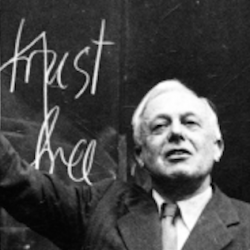Gillian Rose (Hegel Contra Sociology, 21-24) examines how sociology attempts to overcome Kantian problematics, but remains within them all the same.
Neo-Kantianism, she argues, “founded two kinds of ‘sociology,’ two logics of the social: a logic of constitutive principles for the sociology based on the priority of validity, and a logic of regulative postulates for the sociology based on the priority of values. The former identifies social reality by a critique of consciousness; the latter locates social reality within the realm of consciousness and its oppositions.” The first is associated with Durkheim, the latter with Weber.
The Durkheimian logic, “which grants priority to validity” came under criticism for its positivism and “the transformation of the Kantian question of validity into methodologism. The critics of methodologism sought to provide a different kind of account of validity – one which was not motivated by the search for a general logic for the exact or historical sciences, but by an historical critique of that very endeavour.”
Those critics were among the leading Continental thinkers of the twentieth century: Dilthey, Heidegger, Benjamin, Gadamer. They all claim that “the neo-Kantian answers to the question of validity debase the question of being, reality, existence, life or history, by their prepositional or judgmental account of truth and by the correlation between general logic and objectification.”
Instead of returning to Kant’s own transcendentalism, “they developed the kind of metacritique of Kant already attempted by Durkheim: the argument that the Kantian a priori, the categories, itself has a social, historical or external presupposition. This is why they are important for sociological reason.”
This metacritics rejected Kant’s “examination of the limits of discursive reason and the psychoíogism implicit in the reference to processes or contents of consciousness,” but they also rejected Neo-Kantianism, dismissing it as internally contradictory: “the critical project to examine the limits of reason before employing reason itself, and the neo-Kantian project to establish an autonomous logic are contradictory. For how can reason be examined except rationally, and how can a general logic be established except logically? In short, both of these projects can only be accomplished by use of the very capacities whose right use is precisely to be justified.”
To resolve this contradiction, the metacritics started from an acknowledgement of “the unavoidable circularity of any examination of cognition and which derives the social and historical pre- conditions of cognition systematically suppressed by both the Kantian and neo-Kantian approaches. Metacritique turns the neo-Kantian critique of the philosophy of consciousness against neo-Kantianism itself: it exposes the formation and deformation of both transcendental and methodological reason.”
Thus, “Dilthey, Mannheim, Heidegger and Gadamer return to the Kantian question of validity, ‘What are the preconditions of experience?, but judge that the Kantian reference to the categories and their application itself has a precondition : ‘life’ (Dilthey), ‘social-situation’ (Mannheim), ‘Daseitï (Heidegger), ‘history’ (Gadamer).” These social and cultural preconditions form “the presupposition of the use of the categories or of meaning, the a priori of a new kind of ontology.”
Yet the metacritics “remain within a Kantian transcendental circle: the condition of the possibility of experience (meaning) is likewise the condition of the object of experience (meaning), whether the condition is ‘life.’ ‘social- situation,’ ‘Dasein,’ or ‘history.’ The analysis revolves within an hermeneutic or transcendental circle, that is, a circle without a result. A new identity is presupposed between the condition and the conditioned, albeit outside the discourse of consciousness and its oppositions, or of validity and its objectifications.”
This even results in a new quasi-transcendental framework: “The newly specified a priori, the precondition of validity, is transcendental. But the precondition is now external to the mind, and hence appears to acquire the status of a natural, contingent, empirical object. The conditioned, meaning, is isolated and defined in proper methodological fashion. Paradoxically, these approaches, which arose to combat neo-Kantian methodologism, lend themselves readily to methodological exploitation, since they can be read as sets of abstract procedural rules for cognition.”
Sociology formed in, and in reaction to, neo-Kantianism, ends up replicating the structure of neo-Kantianism.












